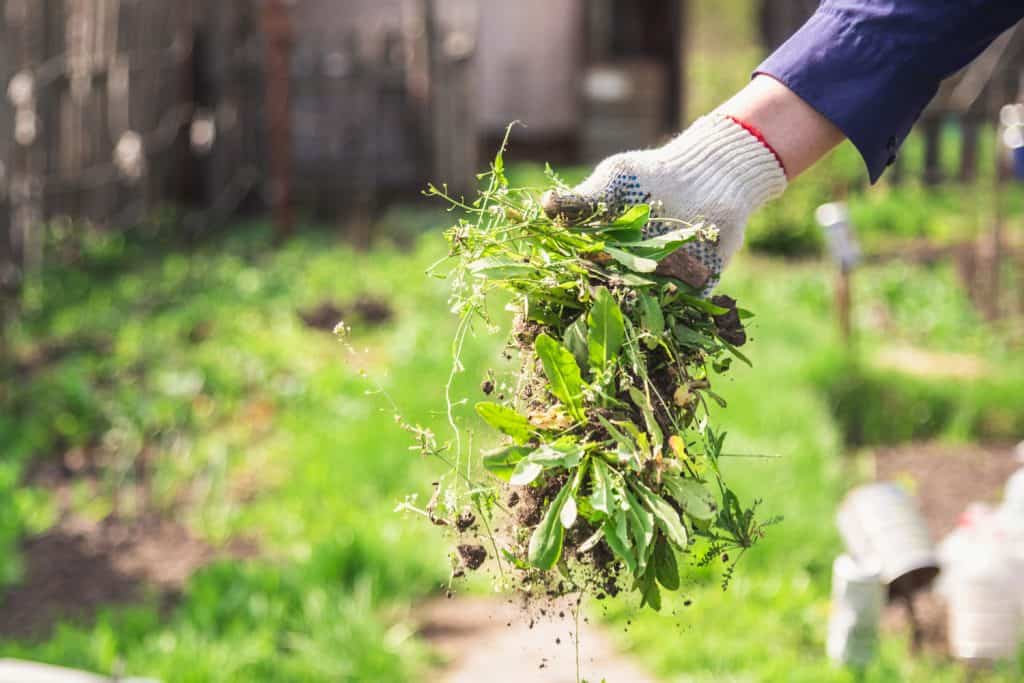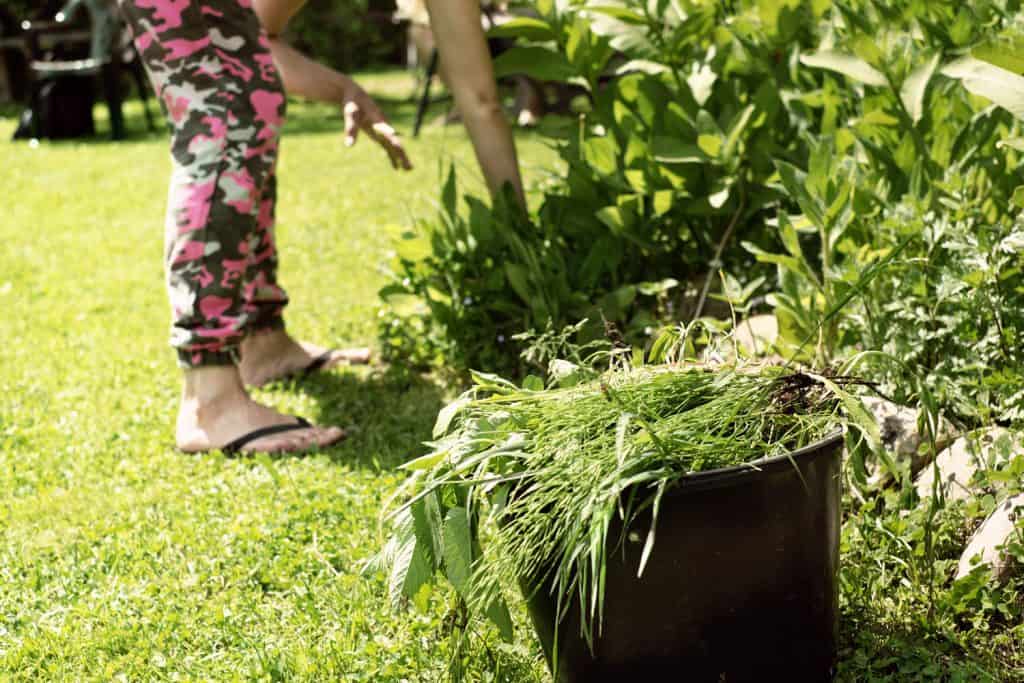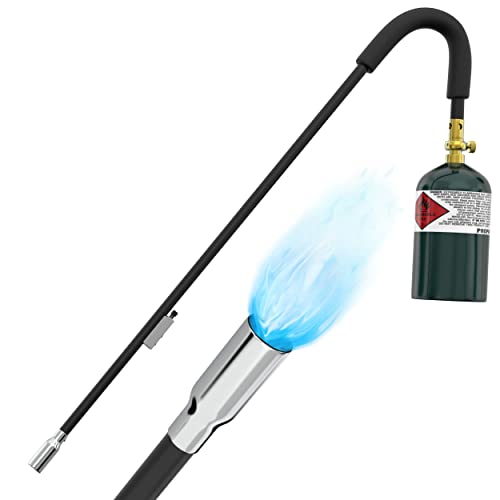Weeds can be an ongoing nuisance when you have a lawn or a garden. You pull one up, and then in the next day or two, you'll see that two or three have grown and their place.
But how fast do garden weeds actually grow? We have researched garden weeds and their growth rate, and in this post, we will answer this question for you.
A typical garden weed can grow anywhere from 1 to 3 inches every 24 hours. A completely new weed can sprout up in your lawn or garden within 12 hours.
The factors that affect weeds' growth rate include the outside temperatures, presence of herbicides, soil conditions, and surrounding shrubs and trees.
Most of the time, you'll find that weeds grow the most during the spring and summer months of the year. Though they're more dormant during the fall and winter season, it doesn't mean that they will completely disappear.
If you want to keep your garden or lawn free of weeds, it's best to use a multifaceted approach to keeping them at bay. Keep reading to learn more about the options available to get rid of them.

How do weeds grow out of nowhere?
Weeds may seem to grow out of nowhere, and in many cases, this is true.
However, the environmental conditions surrounding the weed play the biggest part in whether or not they will sprout up and how often they will do so.
For example, an environment where the weather is warm, moist, or where soil conditions are ideal often leads to rapid growth.
You'll also find that weeds love to grow in areas that have thin turf, such as cracks on the side of the road or in driveways and sidewalks.

Weeds actually have the ability to grow anywhere that they can bloom, and often their seeds will spread with blowing wind, allowing them to grow and spread over large areas.
Weeds may also grow with the season. For example, there are annual, biennial, and perennial weeds.
What happens if you let weeds grow?
If you let weeds grow, it will be a detriment to your lawn or garden in many cases.
Here are some of the ways that weeds can damage your garden if you don't mitigate them.
Weeds can cut off the food supply to surrounding plants and shrubs
The biggest and most important reason why homeowners and gardeners keep a watchful eye on weeds is their ability to siphon food and water from surrounding plants.
Remember that weeds are plants, pesky ones, but plants nonetheless. And just like any other plant, weeds need nutrients, light, and water to survive.
And this means that they will steal nutrients at the expense of your shrubs and surrounding plants. If your garden or lawn doesn't get enough nutrients or other minerals, it will become susceptible to insect infestations and plant diseases.
Weeds tend to suck up any surrounding nutrients from nearby soil, causing plants to wither and die as they grow and thrive.
Weeds take up additional space
Weeds also hurt your lawn and garden by taking up additional space needed for your plants to grow. T
hey can block sunlight if they grow too tall, causing your shrubs and plants to grow less from a lack of energy.
And if left alone, they can also blanket your entire garden and cause your plants and fruit trees to grow and abnormally.
Some weeds varieties are parasitic
It's also important to note that weeds will compete for more than just nutrients and space. They can also directly suck the life out of your plants and trees at the stem.
When they do so, they'll drain your plants ultimately of their nutrients while leaving them open for infestation and plant disease.
They're unsightly and can cause allergies
Weeds can make your lawn or garden area look unsightly and worn down. They can also be harder to get rid of if they're left to grow for months on end.
Untamed weeds can also cause skin irritation and allergic reactions to you or your family members.
Can weeds grow literally overnight?
Yes. A weed can actually grow overnight. A typical garden weed can grow about 1-2 inches overnight with the right warm weather and moisture conditions.
So if you happen to wake up and discover weeds in your lawn that weren't there the day before, know that it's not just in your head.

What are the worst garden weeds?
There are a handful of garden weeds that are known for their invasiveness and prevalence. Let's take a look at them.
Chinese Privet
This particular weed grows in areas with dry or wet soil and can survive in both sun and shade. You'll often see it sprouting up and small cracks in the road.
This evergreen shrub is especially popular in the south. Birds often eat their berries and leave behind the seeds in their feces, causing them to spread further.
You can pull these leaves up by hand or use a herbicide to get rid of them.
Hyacinth
This is probably the most common weed found in your driveway or lawn.
The plant can survive in a wide range of conditions and environments and be especially prevalent in warmer areas such as the south or south-western states. These weeds can be mitigated with your typical herbicides.
Nutgrass or Nutsedge
Nutgrass survives in lawns that are sick, lacking essential nutrients, or are in overall bad condition.
For example, if the lawn is mowed too short, over watered, or too dry, that grass can quickly sprout up and worsen the conditions. The easiest way to get rid of it is by pulling up the weeds and improving the health of your lawn.
How do you get rid of garden weeds quickly?
Garden weeds can be removed using various methods. You can use herbicides, pull them up by hand, or use all-natural methods to get rid of them.
Pull them up
Manual removal using your hands, a hoe, or a shovel is one of the best ways to remove weeds quickly.
Keep in mind that this is best for spot weed removal, and it can become physically exhausting if you're covering a large area.
When pulling up the weeds, be sure to pull the weed up at the root to avoid breaking it and to prevent regrowth.
Vinegar and Salt
A mixture of vinegar and salt is one of the best and quickest ways to remove garden and lawn weeds.
For the solution, combine a cup of regular table salt with a gallon of vinegar and 1 to 2 tablespoons of regular dish soap.
Pour the mixture into a spray bottle and spray it onto the weeds directly. The vinegar and salt will kill and dry out the weeds within a few hours.
However, for larger weeds, you may need to spray them more than once. If you have a large area to cover, it's best to use a plant sprayer.
Buying a plant prayer on Amazon.
Use vodka
Consider mixing an ounce of vodka with one and a half cups of water and two teaspoons of dish soap. Combine in a plastic spray bottle and pour it directly onto the weeds.
The alcohol in the vodka will cause the weeds to dry out, and the dish soap will prevent the weeds from growing again.
Be sure not to spray the solution on your surrounding plants and shrubs. It may be a good idea to cover them with a tarp beforehand.
Find this lawn tarp on Amazon.
Try flame weeding
The practice of flame weeding involves passing a small flame over the weeds using a propane tank. You can typically find these devices at your local hardware store or garden center.
Be sure to keep the wand on the flame weeder away from your other plants and shrubs.
You also want to ensure that you don't perform this method during any dry seasons are spells, as it can cause a fire.
Find this flame weeder on Amazon.
Apply mulch
One of the best ways to get rid of weeds quickly is to smother them with mulch. If you have a large area of weeds on your lawn, you can use mulch derived from wood chips, bark, compost, newspaper, grass clippings, or any other organic matter.
You can also place old shower curtains or ground cloth on top of the weeds to keep them from growing.
Read more: How To Garden With Mulch [Step-By-Step Guide]
Wrapping Things Up
Weeds are entirely opportunistic plants that can overgrow in your lawn or garden almost overnight.
The quickest way to get rid of them is to use a commercial or all-natural herbicide or to pull them up manually. Monitoring your lawn is the best way to keep them at bay all year round.
Before you go, be sure to check out some of our other posts:



